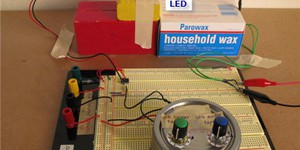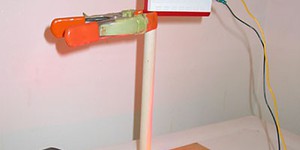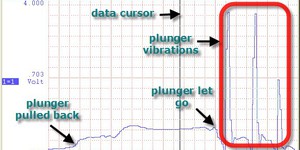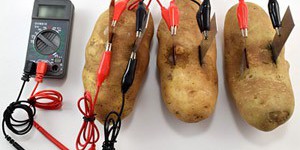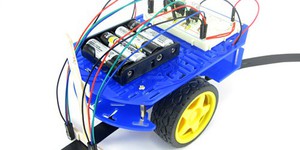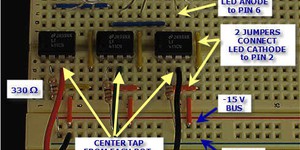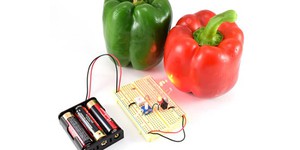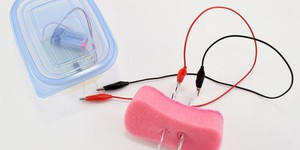Others Like “How Does LED Brightness Vary with Current?” (top 20 results)
|
If you want to get your friend's attention at a crowded sporting event with lots of people cheering, you need to shout. If you're trying to do the same thing in a quiet library, a whisper works. The detection limit for each of our senses depends on the amount of "background" stimulation that is already present. This project uses an LED control circuit to investigate detection of changes in light levels.
Read more
You can see examples of parabolic reflectors in flashlights, car headlights, satellite TV antennas, and even on the sidelines at football games. How do these "dish" antennas work to gather signals? What is the best position for placing the detector for these antennas? In this project, you can use an LED and a simple photodetector to find out for yourself.
Read more
Global warming, climate change, melting ice caps—these are all big events that have an impact our environment. What can we do to help reduce the impact? We can reduce, reuse, and recycle. What can cities do to help? Cities can eliminate waste by saving energy. Cities around the world are switching from incandescent traffic signals to LED traffic signals to save energy and money. That's because LEDs are more efficient than incandescent lamps, which means that LEDs produce more light…
Read more
Have you ever accidentally burned out an LED while building a circuit? What about doing it on purpose—for science, of course! In this science project, you will intentionally send too much current through LEDs to see if they will burn out or even explode! How much current does it take to destroy an LED? How does this compare to the LED's rated current value? Try this project and find out! Check out this page for more LED science projects.
Read more
Strike a key on the piano, and you hear the string vibrating. Just about any object vibrates when it's knocked, but how much and how fast? What properties of the material affect the way it vibrates? This project helps you find out. You'll build a simple light-sensing circuit for measuring the frequency of vibrating springs.
Read more
Imagine telling your friends about your latest science project: using a battery to make a light turn on. You might get some blank stares...sounds a little boring and basic, right? Now tell them you will do it with a potato! Yes, you can actually use fruits and vegetables as part of an electric power source! Batteries power many things around you, including cell phones, wireless video game controllers, and smoke detectors. In this science project, you will learn about the basics of battery…
Read more
How easy is it for you to walk along and follow a line that is painted on the ground? Simple, right? You might be able to follow a line without giving it much thought, but how could a robot do that? In this project, you will build your own automatic line-following robot that can race around a track that you create. This technology has plenty of real-world applications—maybe one day you could help design self-driving cars!
Read more
This is a good project for someone who is interested in both electronics and color vision. The equipment needed is on the expensive side, but if you continue studying electronics, you can use it again and again.
Read more
When you go to the supermarket, how do you pick out ripe fruits and vegetables? You might look at their size or color, or feel them for firmness. That might be easy to do when you pick out a half dozen apples, but imagine if you had to examine thousands of apples growing in a field, or strawberries coming down a conveyor belt getting ready for packaging. Suddenly, it is a lot harder to do yourself! What if a machine could pick and sort the produce for you? In this project, you will address part…
Read more
Water is a valuable resource, and water shortages are a serious problem in many parts of the world. The problem can be made worse by people who waste water; for example, by watering a garden or using sprinklers on their lawn (or a farmer taking care of an entire field) when it has rained recently or the soil is already moist. How can you help conserve water and prevent such waste? One way is to build an electronic soil moisture sensor. This project will show you how to build a circuit that…
Read more
|
Explore Our Science Videos
Design a Seeding Machine
How to Make Magnetic Slime
Make a Thermometer - STEM Activity


